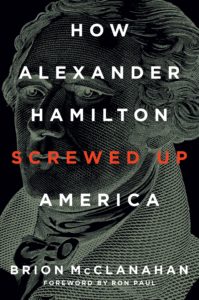Republicans unveiled their tax plan in September to mixed reviews. That was to be expected. It hasn’t gotten any better in recent weeks.
Americans generally want lower taxes. They also want the Republican Party to do something they promised while begging for votes.
Let’s not ask for too much.
One called on the Rush Limbaugh Show in late September suggested that people read Federalist No. 21 to understand why taxes should be lowered. Hamilton, this caller said, showed us the light.
Limbaugh joked that he rapped it. Either way, here is Hamilton entering another modern debate. There is now an app for that, unfortunately.
Hamilton proposed in Federalist No. 21 that “indirect” taxes, meaning tariffs, should be used more extensively than direct because direct taxes created substantial problems for an economy. The modern income tax is a direct tax.
Except we shouldn’t listen to Hamilton. He didn’t mean it. Less than three years after writing Federalist No. 21, Hamilton turned around and argued for…drumroll…a lengthy list of direct taxes, ostensibly because the country “needed it,” but Hamilton suggested that such taxes would only be used in a time of war. The United States wasn’t at war in 1790.
That was Hamilton’s “m.o.” His duplicity knew no bounds.
Which is why he screwed up America.
John Taylor of Caroline called him a tyrant as did a number of forward thinking Americans at the time. They could see Hamilton’s constitutional machinations wrecking the fragile fabric of Union. His top down approach to every problem and his penchant for advancing a stronger central authority at the expense of the states were the exact opposite positions he favored while scribbling the Federalist essays, and many could see that Hamilton’s desire to recreate the corruption of the British constitution would eventually destroy the Union.
It wasn’t “state’s rights” that ripped apart the Union. It was Hamiltonian nationalism, the belief that the general government can do anything it wants as long as it is “necessary and proper” for the “general welfare” of the American people, the Constitution be damned. That is the real story of America, but every school child is fed the opposite narrative from the time they enter kindergarten as a little mind of mush. Uncle Sam knows how to indoctrinate kids, and we want more Uncle Sam in education. Doesn’t make sense.
With Constitution Day a little over a month ago, Americans should reconsider their Hamilton love. They should first avoid downloading the app. After all, Hamilton’s Constitution, the Constitution he favored in 1787 when he called for unlimited central power or the Constitution he advanced as Secretary of Treasury with expansive “implied powers” was the opposite of the Constitution he sold to the states as primary author of the Federalist essays and in speeches to the New York ratifying convention. And he clearly knew it.
 Hamilton, for example, knew his “assumption scheme” where the general government would assume the debts of the several states was expressly rejected by the Philadelphia Convention, but he pushed for it anyway. Same with his favorite project, the Bank of the United States. That idea was shot down so thoroughly that no one in Philadelphia in 1787 thought it would be resurrected once the Constitution was ratified. They were wrong.
Hamilton, for example, knew his “assumption scheme” where the general government would assume the debts of the several states was expressly rejected by the Philadelphia Convention, but he pushed for it anyway. Same with his favorite project, the Bank of the United States. That idea was shot down so thoroughly that no one in Philadelphia in 1787 thought it would be resurrected once the Constitution was ratified. They were wrong.
Hamilton argued in Federalist No. 69 that the American presidency would not resemble a king only to push for executive powers while Secretary of Treasury that George III would have recognized.
Hamilton was a brilliant, narcissistic, psychopath, a man with a real “American story” of “rags to riches,” but a man who did more to undermine the original understanding of the Constitution—an understanding he helped craft—than anyone in American history.
Conservative Americans should stop rapping about Hamilton and start railing against him. If they truly believe in a general government of limited powers, of real “grass roots” politics, then Hamilton is not their guy.
There is a reason a leftist political activist like Lin Manuel-Miranda wrote a play about Hamilton. That should give any conservative pause. Miranda didn’t hijack Hamilton’s legacy. He merely lifted the veil.
But by letting Miranda tell the story, “Who Lives, Who Dies, Who Tells Your Story,” Hamilton gains a reputation he doesn’t deserve. Hamilton’s musical should rather be “Hamilton: The Liar.”
EDITOR’S NOTE: This article was originally published at LewRockwell.com and is republished here under a CreativeCommons 4.0 license.
- Should We Abandon the Original Constitution? - March 31, 2023
- Is the Constitution “Pro-Slavery?” - July 13, 2021
- Why we get it wrong about the “antifederalists” - April 5, 2021
